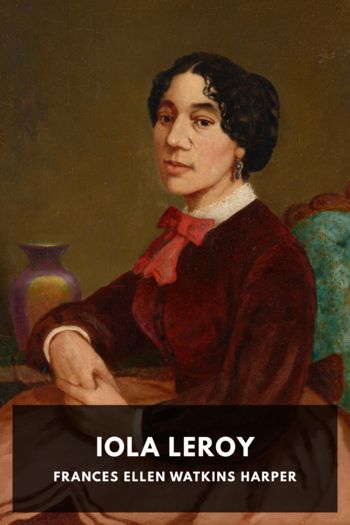Iola Leroy, Frances Ellen Watkins Harper [read aloud books .txt] 📗

- Author: Frances Ellen Watkins Harper
Book online «Iola Leroy, Frances Ellen Watkins Harper [read aloud books .txt] 📗». Author Frances Ellen Watkins Harper
After Robert and Rev. Carmicle had left the hotel, Drs. Latimer, Gresham, and Latrobe sat silent and thoughtful awhile, when Dr. Gresham broke the silence by asking Dr. Latrobe how he had enjoyed the evening.
“Very pleasantly,” he replied. “I was quite interested in that parson. Where was he educated?”
“In Oxford, I believe. I was pleased to hear him say that he had no white blood in his veins.”
“I should think not,” replied Dr. Latrobe, “from his looks. But one swallow does not make a summer. It is the exceptions which prove the rule.”
“Don’t you think,” asked Dr. Gresham, “that we have been too hasty in our judgment of the negro? He has come handicapped into life, and is now on trial before the world. But it is not fair to subject him to the same tests that you would a white man. I believe that there are possibilities of growth in the race which we have never comprehended.”
“The negro,” said Dr. Latrobe, “is perfectly comprehensible to me. The only way to get along with him is to let him know his place, and make him keep it.”
“I think,” replied Dr. Gresham, “every man’s place is the one he is best fitted for.”
“Why,” asked Dr. Latimer, “should any place be assigned to the negro more than to the French, Irish, or German?”
“Oh,” replied Dr. Latrobe, “they are all Caucasians.”
“Well,” said Dr. Gresham, “is all excellence summed up in that branch of the human race?”
“I think,” said Dr. Latrobe, proudly, “that we belong to the highest race on earth and the negro to the lowest.”
“And yet,” said Dr. Latimer, “you have consorted with them till you have bleached their faces to the whiteness of your own. Your children nestle in their bosoms; they are around you as body servants, and yet if one of them should attempt to associate with you your bitterest scorn and indignation would be visited upon them.”
“I think,” said Dr. Latrobe, “that feeling grows out of our Anglo-Saxon regard for the marriage relation. These white negroes are of illegitimate origin, and we would scorn to share our social life with them. Their blood is tainted.”
“Who tainted it?” asked Dr. Latimer, bitterly. “You give absolution to the fathers, and visit the misfortunes of the mothers upon the children.”
“But, Doctor, what kind of society would we have if we put down the bars and admitted everybody to social equality?”
“This idea of social equality,” said Dr. Latimer, “is only a bugbear which frightens well-meaning people from dealing justly with the negro. I know of no place on earth where there is perfect social equality, and I doubt if there is such a thing in heaven. The sinner who repents on his deathbed cannot be the equal of St. Paul or the Beloved Disciple.”
“Doctor,” said Dr. Gresham, “I sometimes think that the final solution of this question will be the absorption of the negro into our race.”
“Never! never!” exclaimed Dr. Latrobe, vehemently. “It would be a death blow to American civilization.”
“Why, Doctor,” said Dr. Latimer, “you Southerners began this absorption before the war. I understand that in one decade the mixed bloods rose from one-ninth to one-eighth of the population, and that as early as 1663 a law was passed in Maryland to prevent English women from intermarrying with slaves; and, even now, your laws against miscegenation presuppose that you apprehend danger from that source.”
“Doctor, it is no use talking,” replied Dr. Latrobe, wearily. “There are niggers who are as white as I am, but the taint of blood is there and we always exclude it.”
“How do you know it is there?” asked Dr. Gresham.
“Oh, there are tricks of blood which always betray them. My eyes are more practiced than yours. I can always tell them. Now, that Johnson is as white as any man; but I knew he was a nigger the moment I saw him. I saw it in his eye.”
Dr. Latimer smiled at Dr. Latrobe’s assertion, but did not attempt to refute it; and bade him good night.
“I think,” said Dr. Latrobe, “that our war was the great mistake of the nineteenth century. It has left us very serious complications. We cannot amalgamate with the negroes. We cannot expatriate them. Now, what are we to do with them?”
“Deal justly with them,” said Dr. Gresham, “and let them alone. Try to create a moral sentiment in the nation, which will consider a wrong done to the weakest of them as a wrong done to the whole community. Whenever you find ministers too righteous to be faithless, cowardly, and time serving; women too Christly to be scornful; and public men too noble to be tricky and too honest to pander to the prejudices of the people, stand by them and give them your moral support.”
“Doctor,” said Latrobe, “with your views you ought to be a preacher striving to usher in the millennium.”
“It can’t come too soon,” replied Dr. Gresham.
XXVII Diverging PathsOn the eve of his departure from the city of P⸺, Dr. Gresham called on Iola, and found her alone. They talked awhile of reminiscences of the war and hospital life, when Dr. Gresham, approaching Iola, said:—
“Miss Leroy, I am glad the great object of your life is accomplished, and that you have found all your relatives. Years have passed since we parted, years in which I have





Comments (0)